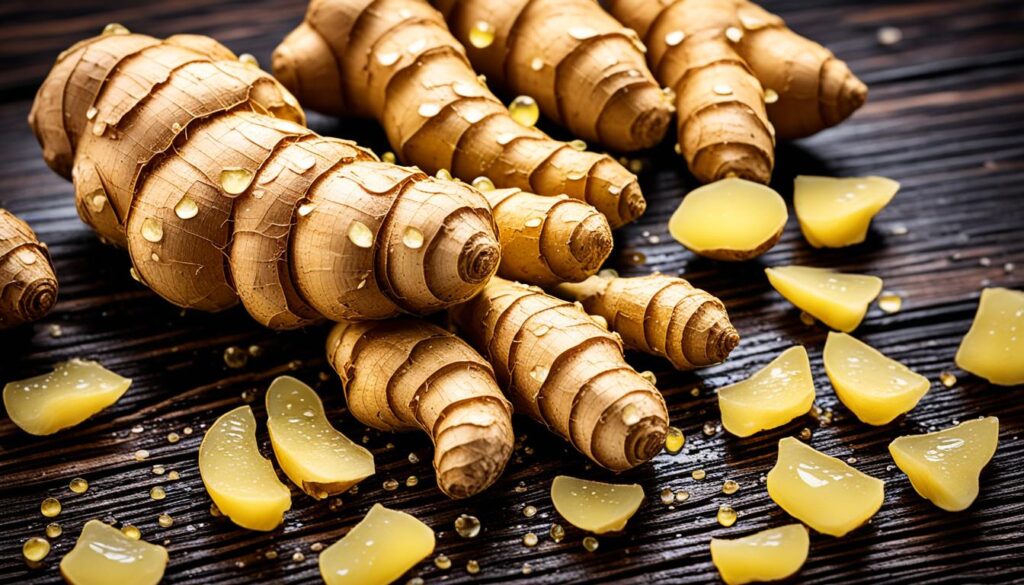Coughing can be annoying and hard to get rid of, often caused by viruses, allergies, or acid reflux. Many people prefer natural home remedies over over-the-counter drugs for relief. These natural treatments can ease coughs without the risks of medicines.
Table of Contents
ToggleWe’ll look at several home remedies for cough, like honey, ginger, hot fluids, steam inhalation, and herbal options like marshmallow root and thyme. These natural solutions can help you feel better and get back to your normal life.
Key Takeaways
- Home remedies for cough can provide effective natural relief without the potential side effects of medications.
- Honey, ginger, hot fluids, and steam inhalation are some of the most popular and proven home remedies for cough.
- Herbal remedies like marshmallow root and thyme can also soothe cough symptoms and support respiratory health.
- Incorporating these natural treatments can help you manage your cough and feel better without relying solely on over-the-counter drugs.
- It’s important to consult with your healthcare provider if your cough persists or worsens, as it may require medical attention.
What is a Cough and Its Causes
A cough is a natural reflex that helps clear your throat and airways of irritants and mucus. It’s a way your body gets rid of foreign particles or clears your respiratory tract. Knowing what causes coughing is key to finding the right treatment.
Coughing as a Natural Defense Mechanism
Coughing is vital for protecting your respiratory system. When your airways detect an irritant, they trigger a cough to get rid of it. This keeps your lungs and airways healthy.
Common Causes of Coughing
Many things can cause coughing, such as:
- Viral infections, like the common cold or flu
- Allergies
- Chronic conditions like asthma or gastroesophageal reflux disease (GERD)
- Environmental factors, such as air pollution or cigarette smoke
If you have a cough that lasts over a few weeks, it might mean there’s an underlying health issue. It’s important to find and treat the cause. Your healthcare provider can help figure out why you’re coughing and suggest the best treatment.

Honey: A Sweet Solution for Cough Relief
Honey is a versatile and time-honored remedy for cough relief. It has soothing and antimicrobial properties. These make it a natural choice for soothing irritated throats and reducing cough frequency. If you’re looking to alleviate a persistent cough or find a natural alternative to over-the-counter medications, incorporating honey for cough relief could be the sweet solution you need.
One of the key benefits of using honey to treat coughs is its ability to coat and soothe the throat. The viscous texture of honey can help reduce irritation and discomfort. This provides immediate relief for those suffering from a nagging cough. Additionally, honey’s antimicrobial properties may help suppress cough symptoms and potentially prevent the need for antibiotics in some cases.
Research has shown that honey can be more effective than some over-the-counter cough medications in suppressing cough symptoms. A spoonful of honey or a warm honey-infused beverage can be a simple and effective way to find relief. This is true for both children and adults dealing with cough issues.

If you’re looking to soothe a sore throat, reduce cough frequency, or find a natural alternative to traditional cough medicines, the benefits of honey for coughs are worth exploring. Incorporating this sweet solution into your home remedy arsenal could be the key to finding the relief you need.
Ginger: Spicy Relief for Coughs
If you’re looking for a natural way to ease your cough, ginger might be the answer. This root not only adds flavor to your food but also fights inflammation in your airways. This can help reduce coughing.
Anti-Inflammatory Properties of Ginger
Ginger contains compounds like gingerol and shogaol that fight inflammation. These can lessen swelling and irritation in your airways. This might help with dry or asthmatic coughs. More studies are needed, but ginger could be a good natural choice for some coughs.
How to Use Ginger for Cough Relief
You can use ginger in several ways to fight a cough:
- Add fresh ginger to hot water or herbal tea for a soothing drink.
- Use ginger in your cooking, like in stir-fries, soups, or roasted veggies.
- Consider ginger supplements, but talk to your doctor first due to possible medication interactions.
Remember, ginger tea might upset your stomach or cause heartburn. Start with small amounts and watch how you feel.

Ginger’s anti-inflammatory properties can help soothe your cough and aid in healing. Try different ginger remedies to find what works best for you and your cough.
Hot Fluids: Soothing Throat Irritation
When you’re dealing with a cough, a simple remedy might be in your kitchen. Warm or hot drinks are known for easing cough and throat irritation. Even though there’s limited science, many people find hot drinks help a lot.
Warm fluids can help your respiratory system by making mucus thinner. This makes it easier to cough out. The heat also calms an inflamed or sore throat, giving quick relief.
Hot beverages can really help with coughs. Drinking a warm cup of tea, broth, or hot water can be very comforting. The heat soothes the throat, and the liquid hydrates and loosens mucus. This can make the scratchy feeling in your throat go away, reducing coughing.

When picking hot drinks for cough relief, choose ones that aren’t too acidic. They could make your throat even more irritated. Herbal teas, warm broths, and warm water with lemon or honey are good options. Try different drinks to see which one works best for you.
Steam Inhalation: Clearing Congestion
If you have a wet cough with lots of mucus, steam can help. The warm, moist air from steam inhalation loosens and thins the mucus. This makes it easier to cough up and clear your airways.
Benefits of Steam Inhalation
Some think steam helps with cough relief, but not all studies agree. Yet, many people say steam inhalation has benefits:
- Loosens and thins out mucus, aiding in clearing congestion
- Soothes throat irritation and inflammation
- Helps open up nasal passages and sinuses
- May provide temporary relief for cough symptoms
How to Do Steam Inhalation Safely
To try steam inhalation for your cough, you can:
- Take a hot shower or bath
- Fill a bowl with hot water, then lean over it while covering your head with a towel
- Use a humidifier to add moisture to the air
You can also add a few drops of essential oils like eucalyptus or rosemary to the water. This can help more with congestion. But be careful, especially with kids, to avoid burns from the hot steam.

Marshmallow Root: A Soothing Herbal Remedy
If you’re looking for a natural way to soothe your cough, consider marshmallow root. This herbal remedy has been used for centuries to ease throat irritation and coughing. Its high mucilage content coats and protects your throat, reducing irritation from coughing.
Recent research shows promising results for marshmallow root in treating coughs. A study in Medical News Today found an herbal cough syrup with marshmallow root helped relieve coughs from common colds and infections.
You can use marshmallow root in different ways, like drinking a soothing tea or taking supplements. The more you steep the root, the more mucilage you’ll get in your drink. This means more benefits of marshmallow root for coughs.
If you have a nagging cough or want to prevent one, try marshmallow root. Always talk to your healthcare provider before starting any herbal supplements, especially if you have health conditions or take other medicines.
Saltwater Gargle: A Simple but Effective Solution
Did you know a simple saltwater gargle can help fight coughs? This home remedy has been around for ages. It can ease those annoying coughs.
Using saltwater to treat coughs is quite effective. It loosens mucus and removes irritants in your throat. This can help stop your coughing fits.
To make a saltwater gargle, mix 1/4 to 1/2 teaspoon of salt with a cup of warm water. Let it cool a bit, then gargle and spit it out. Doing this a few times a day can help ease your cough.
But, saltwater gargles aren’t for everyone. They might not be safe for kids or people with high blood pressure. Always talk to a doctor before trying this remedy, especially if you have health issues.
So, if you’re dealing with a cough, try a saltwater gargle. It’s a classic solution that might just bring you relief.
Home remedies for cough: Bromelain and Thyme
If you’re looking for natural ways to ease a cough, consider bromelain and thyme. These ingredients can help soothe cough symptoms and offer relief.
Bromelain: The Cough-Fighting Enzyme
Bromelain is an enzyme in pineapples that may help fight inflammation and thin mucus. Studies suggest it can make mucus thinner, making it easier to clear from your lungs and throat. Drinking pineapple juice or taking bromelain supplements could ease your cough.
Thyme: An Herbal Remedy for Coughs
Thyme is also a natural option for cough relief. It contains compounds that can relax the throat muscles and reduce coughing. Thyme has been used for respiratory issues for a long time. Recent studies show it may lessen cough symptoms and severity.
Considering bromelain or thyme for cough relief is a good idea. These natural remedies can be part of your self-care. Always talk to your healthcare provider before trying new supplements or remedies.
Dietary Changes for Acid Reflux-Related Coughs
If you have a cough from acid reflux, making some diet changes can help. Acid reflux, or GERD, happens when stomach acid goes back up into the esophagus. This can irritate your throat and cause a cough. By finding and avoiding your personal reflux triggers, you can ease your cough.
One important change is to avoid foods and drinks that can cause reflux. This includes caffeine, alcohol, chocolate, and carbonated drinks. Also, foods like citrus fruits and tomatoes, and high-fat foods can relax the muscle that keeps stomach acid down. This lets acid flow back up and irritate your throat.
Along with avoiding these foods, add more reflux-friendly foods to your diet. Foods like ginger, bananas, oatmeal, and green vegetables can help. These changes can lessen your cough’s frequency and intensity.
Everyone’s reflux triggers are different, so it might take some time to find what works for you. Keeping a food diary can help you identify your problem foods. Work with your healthcare provider to create a diet plan that helps manage your acid reflux cough.
Slippery Elm: A Soothing Throat Remedy
Looking for a natural way to ease your cough and soothe your throat? Consider slippery elm. This herbal remedy has been around for centuries, helping with throat and respiratory issues like coughs.
Slippery elm has a substance called mucilage. This coats and protects the throat, reducing irritation and discomfort. Though not much scientific proof exists, many people find it helpful for cough relief.
You can find slippery elm in teas, lozenges, and capsules. Always follow the instructions on the label when using it for cough relief. It’s generally safe, but check with your doctor before starting, especially if you’re on other medications.
Slippery elm might also help with throat inflammation, not just coughs. So, if you’re looking for a natural cough remedy, give slippery elm a shot.
While slippery elm can be a great natural option, always talk to your doctor, especially if you have health conditions or take other medicines. With proper guidance, slippery elm can be a great way to ease your cough.
Conclusion
There are many home remedies that can help with cough symptoms. Honey, ginger, steam inhalation, and herbs like marshmallow root and thyme are great options. These natural treatments can soothe sore throats, thin mucus, and lessen coughing.
By using these remedies, you can manage your cough naturally. This can improve your overall health and well-being. It’s a safe way to find relief without the side effects of medicines.
If your cough doesn’t get better or gets worse, see a doctor. But, trying these home remedies can help ease your symptoms. It’s a good way to support your body’s healing. Nature has a lot to offer for cough relief.
FAQ
What is a cough and what causes it?
A cough is a natural way our body clears the throat and airways. It gets rid of irritants, mucus, and other stuff. Viral infections, allergies, and chronic conditions like asthma or GERD are common causes. So are environmental factors like air pollution or cigarette smoke.
How can honey help with cough relief?
Honey is better than some over-the-counter cough medicines at easing coughs. It has soothing and antimicrobial properties. This makes it a great natural choice for soothing sore throats and cutting down on coughing.
What are the benefits of using ginger for cough relief?
Ginger has anti-inflammatory properties that can lessen airway inflammation. This can help reduce coughing. Studies show ginger might be good for dry, asthmatic coughs.
How can drinking hot fluids help soothe a cough?
Drinking hot tea, broth, or warm water can comfort you and ease cough symptoms. The warmth helps thin out mucus and soothes a sore throat.
What are the benefits of steam inhalation for coughs?
Steam inhalation can make mucus easier to cough up and clear the airways. The warm, moist air helps relieve a wet cough that brings up mucus or phlegm.
How can marshmallow root help soothe a cough?
Marshmallow root is full of mucilage that can protect and soothe the throat. An herbal cough syrup with marshmallow root can help relieve coughs from common colds and infections.
What are the benefits of gargling with saltwater for cough relief?
Gargling with saltwater can loosen mucus and wash away throat irritants. This may help reduce coughing. Saltwater can lessen the severity of cough symptoms.
How can bromelain and thyme help with cough relief?
Bromelain, found in pineapples, has anti-inflammatory and mucolytic effects. This can lessen cough severity. Thyme has compounds that relax throat muscles and reduce inflammation, helping to ease coughing.
How can dietary changes help with acid reflux-related coughs?
Changing your diet to avoid things like caffeine, alcohol, chocolate, and spicy foods can help. These foods can trigger acid reflux, which can cause coughing. By avoiding these foods, you can lessen coughing.
What are the benefits of using slippery elm for cough relief?
Slippery elm, like marshmallow root, has mucilage that soothes the throat. It’s considered safe and might help ease coughing. It’s worth trying as a natural cough remedy.
Source Links

This article is medically reviewed by Dr. Chandril Chugh, Board-Certified Neurologist, providing expert insights and reliable health information.
Dr. Chandril Chugh is a U.S.-trained neurologist with over a decade of experience. Known for his compassionate care, he specializes in treating neurological conditions such as migraines, epilepsy, and Parkinson’s disease. Dr. Chugh is highly regarded for his patient-centered approach and dedication to providing personalized care.








